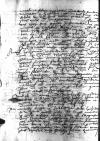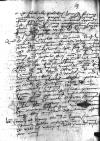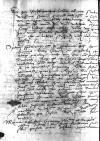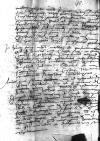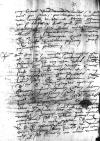In itinere profectionis meae ad ⌊Hungariam⌋ in dominio spectabilis domini ⌊Alexii Thursonis⌋ de mense Iunii proxime praeteriti on the margin⌈de mense Iunii proxime praeteritide mense Iunii proxime praeteriti on the margin⌉ redditae mihi sunt Reverendissimae Dominationis Vestrae ⌊⌋, quae datae erant ⌊Lubaviae⌋ 1535-12-16⌊XVI Decembris1535-12-16⌋. Quae licet tardius, quam speraveram, ad me pervenerint, fuerunt tamen mihi, ultra quam dici poterit, gratissimae, tum quia de ipsius statu et valetudine aliquid intelligerem, tum etiam, quod plenae sunt antiquae amicitiae nostrae, plenae ita, quod visum est mihi legendo eas cum Vestra Reverendissima Dominatione praesens exsistere. Dominationi Vestrae Reverendissimae pro eo maximas et ex animo gratias ... illegible⌈...... illegible⌉ habeo, pro sua humanitate et in me affectione. Deus, ille omnium cordium scrutator, novit nihil iucundius mihi accidere poterit, quam Vestram Reverendissimam Dominationem semel ante vitae meae exitum conspicere dulcissimaque illius consuetudine frui.
Anteaquam de aliis rationem aliquam Vestrae Reverendissimae Dominationi reddam, volui illi primum de meo statu atque condicione scribere. Fui in quartum annum, ut novit Reverendissima Dominatio Vestra, sacratissimae ⌊caesareae et catholicae maiestatis⌋ iussu in ⌊Germaniam⌋ illius orator designatus itaque me (praeter iactantiam loquendo) gessi, ut ⌊caeasar⌋ ipse suique consiliarii maximam mihi laudem tribuerint. Concredidit mihi summas pecuniarum maximas, quas et fideliter partim conservavi partimque, et etiam iuxta maiestatis suae ordinationem distribui. Vocatus tandem ego ad ab ⌊illius maiestate⌋, ut ⌊Neapolim⌋ oratores istius ⌊vayvodae⌋ eo ad se deducerem. Quo de rebus Germanicis simul et Hungaricis mihi
 AAWO, AB, D. 68, f. 87v
concreditis uberiorem informationem acciperet: ivi ⌊Neapolim⌋ usque, deinde ⌊Romam⌋ eius [...] hidden by binding⌈[...][...] hidden by binding⌉ subsecutus sum. Multa bona verba, promissiones ab ⌊illius maiestate⌋ accepi, aliud nihil hidden by binding⌈[hil]hil hidden by binding⌉, licet habeat maiestas sua in manibus mercedes hidden by binding⌈[s]s hidden by binding⌉ in beneficialibus dumtaxat distribuendis ad summam LXXX milium ducatorum annuae, quas in Italia hidden by binding⌈[ia]ia hidden by binding⌉ distribuere noluit propter importunam cardinalium immo et ipsius pontificis petitionem, qui omnia pro se cupiebant. Ne igitur quempiam hoc periculosissimo tempore offenderet hidden by binding⌈[t]t hidden by binding⌉ et omnes in bona spe contineret, abstinuit se penitus ab ista beneficiorum distributione. Ita nec Tridentini cardinali, qui maxime speritur(!), nec ⌊caesaris⌋ domesticis servitoribus nec ⌊Lundensi⌋ provisum est. Quod mihi sperandum hidden by binding⌈[dum]dum hidden by binding⌉ sit, nescio. Deo me commisi, qui hucusque de victu cotidiano providit. In cuius ben[...] hidden by binding⌈[...][...] hidden by binding⌉nitate confido penitus, ne me deserat in se unice sperantem.
AAWO, AB, D. 68, f. 87v
concreditis uberiorem informationem acciperet: ivi ⌊Neapolim⌋ usque, deinde ⌊Romam⌋ eius [...] hidden by binding⌈[...][...] hidden by binding⌉ subsecutus sum. Multa bona verba, promissiones ab ⌊illius maiestate⌋ accepi, aliud nihil hidden by binding⌈[hil]hil hidden by binding⌉, licet habeat maiestas sua in manibus mercedes hidden by binding⌈[s]s hidden by binding⌉ in beneficialibus dumtaxat distribuendis ad summam LXXX milium ducatorum annuae, quas in Italia hidden by binding⌈[ia]ia hidden by binding⌉ distribuere noluit propter importunam cardinalium immo et ipsius pontificis petitionem, qui omnia pro se cupiebant. Ne igitur quempiam hoc periculosissimo tempore offenderet hidden by binding⌈[t]t hidden by binding⌉ et omnes in bona spe contineret, abstinuit se penitus ab ista beneficiorum distributione. Ita nec Tridentini cardinali, qui maxime speritur(!), nec ⌊caesaris⌋ domesticis servitoribus nec ⌊Lundensi⌋ provisum est. Quod mihi sperandum hidden by binding⌈[dum]dum hidden by binding⌉ sit, nescio. Deo me commisi, qui hucusque de victu cotidiano providit. In cuius ben[...] hidden by binding⌈[...][...] hidden by binding⌉nitate confido penitus, ne me deserat in se unice sperantem.
Ego ad serenissimi ⌊Romanorum etc. regiae maiestatis⌋ ac oratorum ⌊vayvodae⌋ instantiam de missus sum ad hunc vayvodam pro componenda hidden by binding⌈[a]a hidden by binding⌉ pace inter praefatos principes. Pollicebantur oratores vayvodae ⌊caesari⌋ de pace futura maximam spem, modo oratorem eo mittere non dedignaretur. Licet ⌊maiestas sua⌋ faciliter induci non potuit ad mittendum oratorem suum, nihilominus, ne aliquando illi obici possit, sua culpa aliquid neglectum fuisse, me huc destinavit cum pleno mandato et alter oratorum ⌊vayvodae⌋, videlicet reverendissimus dominus ⌊Franciscus de Frangepanibus⌋ archiepiscopus Colocensis huc rediit, quo dominum suum de ⌊caesareae maiestatis⌋ bona voluntate et circa pacem huiusmodi faciend(am) affectione redderet  AAWO, AB, D. 68, f. 88r certiorem. Alter vero, videlicet reverendissimus dominus Stephanus Brodaricus episcopus Quinqueecclesiensis ap curiam ⌊caesareae maiestatis⌋ sequitur, ut si quid intercideret difficultatis, cum illius maiestate commodius tractare et media invenire possit. Haec facta sunt ad maximam ipsius ⌊vayvodae⌋ petitionem.
AAWO, AB, D. 68, f. 88r certiorem. Alter vero, videlicet reverendissimus dominus Stephanus Brodaricus episcopus Quinqueecclesiensis ap curiam ⌊caesareae maiestatis⌋ sequitur, ut si quid intercideret difficultatis, cum illius maiestate commodius tractare et media invenire possit. Haec facta sunt ad maximam ipsius ⌊vayvodae⌋ petitionem.
Veni itaque salvus in hac(!) civitate(!) (modo civitas dici mereatur) die XII mensis Iunii et cum ⌊caesarea maiestas⌋ est cum ⌊Francorum rege⌋ impedita, video, quod hic nihil tractare volunt conclusive, sed quantum conicio, volunt finem belli Gallici exspectare et sic de die in diem rem prorogant. Ego interim die ultima Iunii, propter aeris istius loci infectionem, incidi in gravissimam infirmitatem et febris continua et acutissima me invasit duravitque ista mea infirmitas dies XXI. Ita et taliter, quod omnes de mea vita desperarunt, ego etiam et animam et quicquid Dei benignitate habebam, igitur soli Deo commisi. Convalui tamen s written over s⌈sss written over s⌉olius Dei clementia, non autem istorum hominum humanitate nec medicorum scientia, nec aeris immutatione. Nempe a die ingressus mei in hunc locum non fuit pluvia estque calor extensissimus. ⌊Waradinum⌋ est in loco basso sub monte inter duos rivulos nihil praeter paludes generantes, ita quod potius spelunca appellari possit quam civitas, ob diversas etiam rationes, quas subticeo orig. subtitio⌈subticeosubticeo orig. subtitio⌉, hic non inventa fuit aqua endiviae orig. andiviae⌈endiviaeendiviae orig. andiviae⌉ nec buglossae neque siruppi neque iuleppum, reobarbara et manna fuerunt hic omnibus incognita. Iam(?) cogitet in se Vestra Reverendissima Dominatio, quomodo convaluisse potuit suus Lundensis. Liberatus tamen, ut dixi, a
 AAWO, AB, D. 68, f. 88v
morbo et febre, appetitus commedendi paulatim revertitur. Sed ita extenuatus sum et debilis, ut vix quis credere poterit, qui non suis oculis non conspexerit.
AAWO, AB, D. 68, f. 88v
morbo et febre, appetitus commedendi paulatim revertitur. Sed ita extenuatus sum et debilis, ut vix quis credere poterit, qui non suis oculis non conspexerit.
Familiares mei tres propter infirmitatem in ⌊Germaniam⌋ per Cotzkas delati sunt, duo aegrotant usque ad mortem. Ita mecum agi hidden by binding⌈[i]i hidden by binding⌉tur in isto regno, ex quo si Dominus Deus me semel liberaverit, amplius numquam revertar, non modo propter aeris infectionem ms. infestionem(!)
⌈infectioneminfectionem ms. infestionem(!)
⌉, sed alias diversas rationes, etiamsi ⌊caesaris hidden by binding⌈[is]is hidden by binding⌉⌋ indignatio mihi exspectanda foret.
Antequam ⌊Hungariam⌋ ingrederer, per postas expedivit me ex ⌊Guns⌋ ⌊maiestas caesarea⌋, ut in ⌊Germania⌋ cum quibusdam principibus prius secreta quaedam tractarem ms. tractaram(!)
⌈tractaremtractarem ms. tractaram(!)
⌉ atque alias quasdam res necessarias disponerem, quod ita diligentissime feci.
Ita factum est, ut Dominationis Vestrae Reverendissimae litterae in ⌊Italiam⌋, deinde in German missae sunt deinde in ⌊Germaniam⌋ hinc ms. hunc(!)
⌈hinchinc ms. hunc(!)
⌉ inde missae sint et tardius quam desideravimus ad manus meas pervenerunt. Ideo non aegre ferre dignabitur, quoniam hidden by binding⌈[m]m hidden by binding⌉ citius illis written over m⌈misis written over m⌉ responderim.
Quid de communi amico nostro illustri superinscribed⌈illustriillustri superinscribed⌉ domino ⌊Laski⌋ scripserit, intellexi et Dominationi Vestrae Reverendissimae gratias habeo. ⌊Hunc⌋ ob amorem Vestrae Reverendissimae Dominationis semper, ubi ubi potui, et commendavi et promovi etc. etc.
Pro novitatibus missis ex Lubicensi et duce Holsatiae Dominationi Vestrae Reverendissimae gratiam habeo. Et longe maiorem, quod mihi copiam eorum, quae ad magnificum dominum ⌊Cornelium Scepperum⌋ scribere dignata ms. dingnita(!)
⌈dignatadignata ms. dingnita(!)
⌉ sit, miserit, quae mihi gratissima fuerunt taliter, ut in extrema ista mea et periculosissima infirmitate ita solatii fuerunt, ut plus vigesies mihi praelegi fecerim. Quoniam
 AAWO, AB, D. 68, f. 89r
et ego filius ille prodigus hucusque fuerim, emendare me proposui. Dominus ⌊Iesus Christus⌋ pro sua gratia continuo rogandus est fideliter, ut eam impartiatur, sine qua non video me quicquam polliceri posse. ⌊Hunc⌋ ipsum rogo, ut et Vestram Reverendissimam Dominationem in suo proposito confirmet.
AAWO, AB, D. 68, f. 89r
et ego filius ille prodigus hucusque fuerim, emendare me proposui. Dominus ⌊Iesus Christus⌋ pro sua gratia continuo rogandus est fideliter, ut eam impartiatur, sine qua non video me quicquam polliceri posse. ⌊Hunc⌋ ipsum rogo, ut et Vestram Reverendissimam Dominationem in suo proposito confirmet.
Quod de domino ⌊Cornelio⌋, communi nostro amico, nihil iamdudum intellexerit, admiror vehementer, solet enim in scribendo et agendis rebus esse diligentissimus. Hoc scio imprimis ⌊illum⌋ rectissime valere et ipse una cum domino ⌊Gotscalco Erici⌋ nostro in ⌊Daniam⌋ cum classe et milite proficiscitur vel iam profectus est. Quemadmodum Reverendissima Dominatio Vestra ex exemplari unius litterae ipsius domini ⌊Cornelii⌋ ad ⌊regiam maiestatem Romanorum⌋ novissime datae, quod maiestas sua ad me misit, clarius intelligere poterit, et eandem quam devotissime rogo, et(?) ob brevitatem copiam illius litterae mitto, quia in veritate istae sunt primae litterae, quantas post meam restitutionem scripserim, et male depictae sunt, quia non possum eas rescribere, et amanuenses duo valde aegrotant, itaque boni consulere dignabitur, obsecro.
Littera ⌊Cornelii⌋ ad ⌊regiam maiestatem⌋ in lingua sive ideomate Gallica conscripta erat, quam de verbo ad verbum in Latinum sermonem transferre curavi.
 AAWO, AB, D. 68, f. 89v
AAWO, AB, D. 68, f. 89v
Ea, quae ⌊Wolffgangus Haller⌋ ad me scribit, verissima sunt, quoniam eadem ipsa a ⌊caesarea et regia maiestatibus⌋ taliter accepi. Quia tamen ⌊ipse⌋ omnia in unum redegit, copias suarum litterarum mise mittere volui, ut omnia in unum collecta facilius intelligat Dominatio Vestra superinscribed⌈Dominatio VestraDominatio Vestra superinscribed⌉, et quo ego a labore scribendi eadem liberari possim.
Optime sperarem ego de profectione domini ⌊de Beveres⌋, dominorum ⌊Cornelii⌋ et ⌊Gotstalci⌋ et aliorum procerum, modo tam diu non fuissent immorati. Nam ego ex Coppenhagensibus iamdudum litteras accepi, quibus indicabant se ob commeatus penuriam ultra festum Pentecostis proxime elapsum[1] diu sustinere non posse, prorogationis istius causam dedisse ferunt dominum de Hoichstrassen ⌊Hollandinorum⌋ praefectus, qui Hollandos avertisse dicitur, ne ⌊reginali maiestati⌋ aut ⌊caesareae maiestati⌋ subsidium aliquod in pecunia aut navibus praestare voluerint. Qui numquam satis aperte dixerunt se nolle contra Holsatiae ducem in minimo opponere, quantumcumque etiam aliter iusserit ⌊caesarea maiestas⌋.
Iam E intelligit Vestra Reverendissima Dominatio, quomodo res in ⌊Flandria⌋ pro ⌊caesareae maiestatis⌋ commodo tractentur.
Maxima difficultate ⌊caesaream maiestatem⌋, cum ⌊Neapoli ms. Neapolis(!)
⌈NeapoliNeapoli ms. Neapolis(!)
⌉⌋ essem, induxi, ut duci Frederico subsidium praestet contra Holsatiae ducem,
 AAWO, AB, D. 68, f. 90r
tandem propter meam importunitatem commisit tunc reginali maiestati dominae ⌊Mariae⌋ et ceteris consiliariis in partibus ⌊Flandriae⌋, ne quid praetermitterent, quod ad subveniendum Frederico, comiti palatino et Koppenhagensibus {subveniendum} pertineret. Sed quanti momenti sunt mandata suae ⌊caesareae maiestatis⌋ apud quosdam, iam in hoc negotio Danico perspicere potuimus.
AAWO, AB, D. 68, f. 90r
tandem propter meam importunitatem commisit tunc reginali maiestati dominae ⌊Mariae⌋ et ceteris consiliariis in partibus ⌊Flandriae⌋, ne quid praetermitterent, quod ad subveniendum Frederico, comiti palatino et Koppenhagensibus {subveniendum} pertineret. Sed quanti momenti sunt mandata suae ⌊caesareae maiestatis⌋ apud quosdam, iam in hoc negotio Danico perspicere potuimus.
In hunc diem nihil intellexi de profectione domini ⌊de Beveris⌋ cum classe sua ac dominorum ⌊Cornelii⌋ et ⌊Gotscalci⌋. Cum primum aliquid habuero et mihi oportunitas mittendi litteras offeratur, non omittam Vestrae Reverendissimae Dominationi illud indicare, simul et ea significare, quae a ⌊caesarea maiestate⌋ et ill belli successibus intellexero.
Amicos, quos salutari desiderat atque ad respondendum hortari desiderat, non est, quod oretenus id praestare valeam, quia tardius, quam optaveram, Dominationis Vestrae Reverendissimae litterae ad me pervenerunt.
⌊Georgium Loxanum⌋ novissimo de mense Mai, cum ⌊Augustae⌋ essem, incolumem unacum sua formosissima Catherinella aquila dimisi et ibidem in hospitio meo, videlicet apud dominum ⌊Anthonium Fugger⌋, dignissima saepius de Vestra Reverendissima Dominatione mentio intercidit. Hic quare non responderit, ignoro, est tamen Vestrae Reverendissimae Dominationi observandissimus. Litteris meis ipsum hortabor, ut se emendet et diligentiorem se exhibeat.
 AAWO, AB, D. 68, f. 90v
AAWO, AB, D. 68, f. 90v
Dominum ⌊Georgium Zabka⌋ in ⌊Insprug⌋ incolumem reliqui et fama erat ipsum serenissimi ⌊Romanorum etc. regiae maiestatis⌋ nomine ad serenissimum ⌊Poloniae regem⌋ profecturum.
Illustris item dominus ⌊Leonardus Comes a Nogarollis⌋ similiter rectissime valet, hic ex ⌊Eneponte⌋ in negotio Hungarico pro unius articuli declaratione fuit ad ⌊caesaream maiestatem⌋ remissus. Rediit salvus in aula regia et laetissime vivit. Credat Reverendissima Vestra Dominatio hunc esse unum dignissimum et omni honore et
D(ominationis) or D(ominationi)⌈D(ominationis)D(ominationis) or D(ominationi)⌉
Vestrae amantissimum.
Dominum Praesinger in ⌊Vienna⌋ dimisi die 29 Maii, ubi cum uxore triumphat. Regiam aulam hic non sequitur, ubi causam aliquam domi permanendi habere potest.
Honestissimus denique nobilis ille Ioachimus a Dalhem or Dulhem⌈DalhemDalhem or Dulhem⌉ mihi quoque amicissimus regiam aulam continuo sequitur. Hunc incolumem quoque in ⌊Eneponte⌋ reliqui. Omnes sunt studiosissimi Dominationis Vestrae inservitores, et nescio, quo spiritu ducuntur, cum apud me sunt, laetissime vivunt et Reverendissimae Dominationis Vestrae mentionem faciunt, dicentes se in locum Reverendissimae Dominationis Vestrae in aula uti, videlicet quia liberiores mecum quam
 AAWO, AB, D. 68, f. 91r
cum ceteris dominis vivunt viventes. O, quatenus pro salute, pro longa et incolumi vita eiusdem Vestrae Reverendissimae Dominationis bibunt, ita ut, si ⌊Bachus⌋ in deos quid po(sse)t, non dubitem, qui Dominatio Vestra annos Matusalemi longe sit superatura. Licet ex eo mihi contingit, quod ⌊Tolleti⌋ ex Crato Tolletano sequenti die contingere soleat.
AAWO, AB, D. 68, f. 91r
cum ceteris dominis vivunt viventes. O, quatenus pro salute, pro longa et incolumi vita eiusdem Vestrae Reverendissimae Dominationis bibunt, ita ut, si ⌊Bachus⌋ in deos quid po(sse)t, non dubitem, qui Dominatio Vestra annos Matusalemi longe sit superatura. Licet ex eo mihi contingit, quod ⌊Tolleti⌋ ex Crato Tolletano sequenti die contingere soleat.
Reverendissime Domine.
Die 27 mensis praeteriti missus est ad me ex ⌊Germania⌋ maximus s litterarum fasciculus, et cum inter alias litteras essent litterae ⌊Bartholomei Welser⌋, cuius scribae manus mihi notissima est et in suprascriptione esset idem titulus et nomen idem, ex ignorantia litteras Reverendissimae Dominationi Vestrae inscriptas aperivi. Et cum imprimis inspicerem schedam illam rationis impositam, statim cognovi, quod ad me datae non essent, diligentius legi suprascriptionem et inveni illas Vestrae Reverendissimae Dominationi inscriptas. Sicut me Deus adiuvet, litteras non legi et stati written over u⌈uii written over u⌉m reclusi. Peccavi maxime, quia aperui inconsiderate, sed in veritate peccavi ex ignorantia et nullo proposito. Reverendissimam Vestram Dominationem quam affectuosissime rogo, ut veniam dare et istam illatam iniuriam, si quae est, mihi pro suo summo in me amore remittere
 AAWO, AB, D. 68, f. 91v
dignabitur. Daturus sum operam, ne in posterum hidden by binding⌈[m]m hidden by binding⌉ contingat.
AAWO, AB, D. 68, f. 91v
dignabitur. Daturus sum operam, ne in posterum hidden by binding⌈[m]m hidden by binding⌉ contingat.
Non fuissem ausus tam prolixsas et male depictas litteras ad Vestram Reverendissimam Dominationem scribere, nisi taliter suis novissimis litteris imperasset. Et si erratum est, det veniam, quaeso, licet adhuc satis debilis, vix tamen adhuc me continere potui, ne prolixiores facerem, ita genius me impellit et, quemadmodum Dominatio Vestra Reverendissima scripsit videri se coram agere, ita et mihi visum est.
Oblitus sum scribere, quemadmodum ⌊Romae⌋ invenerim dominum ⌊Ioannem Campensem⌋ apud reverendissimum dominum ⌊cardinalem Contarinum⌋ Venetum virum doctissimum, qui illum in maxima veneratione habet et omnia elargitur, quae desiderare poterit. Hic mirum in modum apud omnes Reverendissimam Vestram Dominationem extollit et commendat.
Reverendissime Domine, frater et amice tamquam pater colendissime. Dominus Deus Vestram Reverendissimam Dominationem in suo sancto proposito incolumem diu servet et prosperet. Cui me tamquam patri officiosissimo perpetuo commendo.
 AAWO, AB, D. 68, f. [1r] unnumbered after 91
AAWO, AB, D. 68, f. [1r] unnumbered after 91
 AAWO, AB, D. 68, f. 87v
concreditis uberiorem informationem acciperet: ivi
AAWO, AB, D. 68, f. 87v
concreditis uberiorem informationem acciperet: ivi  AAWO, AB, D. 68, f. 88r certiorem. Alter vero, videlicet reverendissimus dominus Stephanus Brodaricus episcopus Quinqueecclesiensis ap curiam
AAWO, AB, D. 68, f. 88r certiorem. Alter vero, videlicet reverendissimus dominus Stephanus Brodaricus episcopus Quinqueecclesiensis ap curiam  AAWO, AB, D. 68, f. 88v
morbo et febre, appetitus commedendi paulatim revertitur. Sed ita extenuatus sum et debilis, ut vix quis credere poterit, qui non suis oculis non conspexerit.
AAWO, AB, D. 68, f. 88v
morbo et febre, appetitus commedendi paulatim revertitur. Sed ita extenuatus sum et debilis, ut vix quis credere poterit, qui non suis oculis non conspexerit.
 AAWO, AB, D. 68, f. 89r
et ego filius ille prodigus hucusque fuerim, emendare me proposui. Dominus
AAWO, AB, D. 68, f. 89r
et ego filius ille prodigus hucusque fuerim, emendare me proposui. Dominus  AAWO, AB, D. 68, f. 90r
tandem propter meam importunitatem commisit tunc reginali maiestati dominae
AAWO, AB, D. 68, f. 90r
tandem propter meam importunitatem commisit tunc reginali maiestati dominae  AAWO, AB, D. 68, f. 91r
cum ceteris dominis vivunt viventes. O, quatenus pro salute, pro longa et incolumi vita eiusdem Vestrae Reverendissimae Dominationis bibunt, ita ut, si
AAWO, AB, D. 68, f. 91r
cum ceteris dominis vivunt viventes. O, quatenus pro salute, pro longa et incolumi vita eiusdem Vestrae Reverendissimae Dominationis bibunt, ita ut, si  AAWO, AB, D. 68, f. 91v
dignabitur. Daturus sum operam, ne in posterum hidden by binding⌈[m]m hidden by binding⌉ contingat.
AAWO, AB, D. 68, f. 91v
dignabitur. Daturus sum operam, ne in posterum hidden by binding⌈[m]m hidden by binding⌉ contingat.



